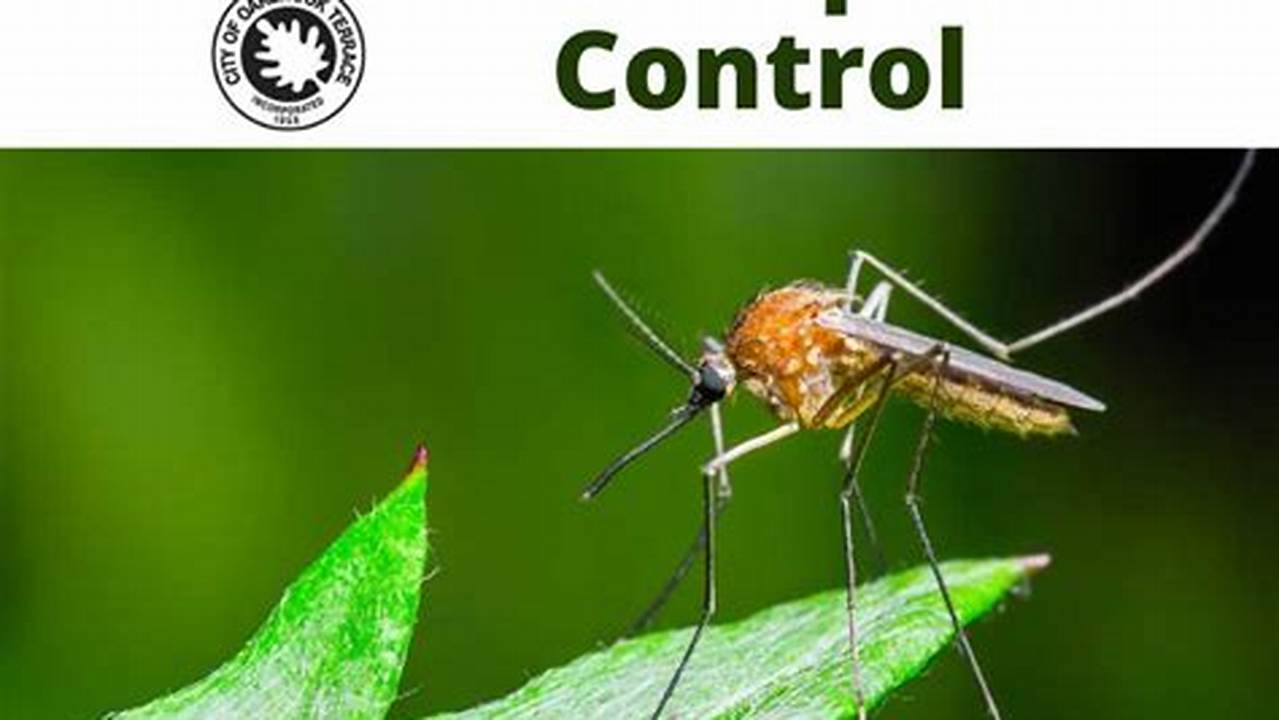
Mosquito control in Temple Terrace, Florida, is a crucial aspect of public health and well-being. Mosquitoes transmit various diseases, including Zika virus, dengue fever, and malaria, posing significant health risks to the community. To combat this, effective mosquito control measures are essential.
Historically, mosquito control in Temple Terrace has been a collaborative effort involving the city government, local health organizations, and residents. The city implements comprehensive mosquito surveillance and control programs that include regular inspections, larviciding, and adulticiding. These measures aim to reduce mosquito populations, prevent disease transmission, and protect public health.
The importance of mosquito control in Temple Terrace cannot be overstated. Effective mosquito management helps safeguard the health of residents, promotes a more comfortable living environment, and supports local tourism and economic development. By minimizing mosquito-borne diseases, the community can enjoy a healthier and more vibrant quality of life.
Mosquito Control in Temple Terrace
Mosquito control in Temple Terrace is a critical public health measure, encompassing various essential aspects:
- Surveillance: Monitoring mosquito populations and disease activity.
- Larviciding: Eliminating mosquito larvae in breeding grounds.
- Adulticiding: Controlling adult mosquitoes through spraying or traps.
- Education: Informing the public about mosquito-borne diseases and prevention.
- Collaboration: Partnerships among government, health organizations, and residents.
Effective mosquito control requires a multifaceted approach that addresses various aspects of mosquito ecology and human behavior. Surveillance helps identify areas with high mosquito populations and disease risk. Larviciding targets mosquito breeding grounds to prevent population growth. Adulticiding reduces the number of adult mosquitoes that can transmit diseases. Education empowers residents to take personal protective measures and contribute to community-wide mosquito control efforts. Collaboration ensures a coordinated and comprehensive response to mosquito-borne disease threats.
Surveillance
Surveillance is a critical component of mosquito control in Temple Terrace, Florida. By closely monitoring mosquito populations and disease activity, public health officials can identify areas at high risk for mosquito-borne diseases and implement targeted control measures.
Surveillance involves regular inspections of potential mosquito breeding grounds, such as standing water in containers, tires, and clogged gutters. Mosquito traps are also used to collect samples for testing, which helps identify the presence of disease-carrying mosquitoes.
Surveillance data is used to guide mosquito control activities, such as larviciding and adulticiding. By targeting areas with high mosquito populations or disease activity, control measures can be more effective in reducing the risk of mosquito-borne diseases.
The practical significance of surveillance in mosquito control cannot be overstated. It provides public health officials with the information they need to make informed decisions about mosquito control strategies and allocate resources effectively. Ultimately, surveillance helps to protect the health of Temple Terrace residents by reducing the risk of mosquito-borne diseases.
Larviciding
Larviciding is a crucial component of mosquito control in Temple Terrace, Florida, as it targets mosquito larvae before they mature into adults. Mosquitoes typically lay their eggs in standing water, such as in containers, tires, and clogged gutters. By eliminating mosquito larvae in these breeding grounds, larviciding helps to reduce the overall mosquito population and the risk of mosquito-borne diseases.
Larviciding is typically done using chemical or biological agents that are applied to standing water. These agents kill mosquito larvae without harming other aquatic life. Larviciding is an effective way to control mosquito populations, especially in areas where there is a high risk of mosquito-borne diseases.
In Temple Terrace, larviciding is an important part of the city’s mosquito control program. The city’s mosquito control team inspects potential mosquito breeding grounds and applies larvicide to any standing water that is found. This helps to reduce the number of mosquitoes in the city and protect residents from mosquito-borne diseases.
Larviciding is a safe and effective way to control mosquito populations. It is an important part of mosquito control in Temple Terrace and helps to protect residents from mosquito-borne diseases.
Adulticiding
Adulticiding is a crucial aspect of mosquito control in Temple Terrace, Florida, as it targets adult mosquitoes that can transmit diseases to humans. Adult mosquitoes are typically controlled using spraying or traps.
- Spraying: Adulticides are applied to areas where adult mosquitoes are known to rest or breed, such as vegetation, standing water, and structures. Spraying can be done using truck-mounted or handheld sprayers.
- Traps: Mosquito traps are placed in areas where adult mosquitoes are likely to be present, such as parks, yards, and near bodies of water. Traps lure mosquitoes using light, carbon dioxide, or other attractants, and then trap them inside.
Adulticiding is an effective way to control adult mosquito populations and reduce the risk of mosquito-borne diseases. It is an important part of mosquito control in Temple Terrace and helps to protect residents from mosquito-borne diseases.
Education
Education is a vital component of mosquito control in Temple Terrace, Florida, as it empowers residents to take personal protective measures and contribute to community-wide mosquito control efforts. Educating the public about mosquito-borne diseases and prevention helps to reduce the risk of mosquito-borne diseases in the community.
Mosquito-borne diseases, such as Zika virus, dengue fever, and malaria, can have serious health consequences. By educating the public about these diseases, residents can be more aware of the risks and take steps to protect themselves and their families. Education campaigns can also help to reduce the stigma associated with mosquito-borne diseases, which can prevent people from seeking medical attention when needed.
In addition to educating the public about mosquito-borne diseases, it is also important to educate the public about mosquito prevention. Mosquitoes typically breed in standing water, so eliminating mosquito breeding grounds is an important way to reduce mosquito populations. Residents can help to reduce mosquito breeding grounds by emptying standing water from containers, tires, and clogged gutters. They can also help to keep their yards free of debris that can attract mosquitoes.
Education is a key component of mosquito control in Temple Terrace. By educating the public about mosquito-borne diseases and prevention, residents can help to reduce the risk of mosquito-borne diseases in the community.
Collaboration
Collaboration among government, health organizations, and residents is essential for effective mosquito control in Temple Terrace, Florida. Mosquito control is a complex issue that requires a multifaceted approach, and no single entity can address it alone. Partnerships between these groups allow for a coordinated and comprehensive response to mosquito-borne disease threats.
Government agencies play a vital role in mosquito control by implementing surveillance, larviciding, and adulticiding programs. Health organizations provide expertise in disease prevention and treatment, and they can help to educate the public about mosquito-borne diseases. Residents can contribute to mosquito control by eliminating mosquito breeding grounds around their homes and taking personal protective measures, such as using insect repellent and wearing long sleeves and pants when outdoors.
There are several real-life examples of successful collaborations between government, health organizations, and residents in Temple Terrace. In 2016, the city partnered with the Florida Department of Health to conduct a mosquito surveillance and control program that resulted in a significant reduction in the number of mosquito-borne disease cases. In 2018, the city partnered with local health organizations to launch a public education campaign about mosquito-borne diseases and prevention. The campaign reached thousands of residents and helped to raise awareness about the importance of mosquito control.
The practical significance of collaboration in mosquito control cannot be overstated. By working together, government, health organizations, and residents can create a safer and healthier community for all.
Frequently Asked Questions about Mosquito Control in Temple Terrace
This section provides answers to some frequently asked questions about mosquito control in Temple Terrace, Florida. These questions and answers are intended to provide a better understanding of mosquito control and its importance for the community.
Question 1: Why is mosquito control important in Temple Terrace?
Mosquito control is important in Temple Terrace because mosquitoes can transmit serious diseases, such as Zika virus, dengue fever, and malaria. By controlling mosquito populations, we can reduce the risk of these diseases being transmitted to humans.
Question 2: What is the city of Temple Terrace doing to control mosquitoes?
The city of Temple Terrace has a comprehensive mosquito control program that includes surveillance, larviciding, and adulticiding. Surveillance involves monitoring mosquito populations and disease activity. Larviciding involves treating mosquito breeding grounds with larvicide to kill mosquito larvae. Adulticiding involves spraying or trapping adult mosquitoes.
Question 3: What can residents do to help control mosquitoes?
Residents can help control mosquitoes by eliminating mosquito breeding grounds around their homes and taking personal protective measures. Eliminating mosquito breeding grounds involves emptying standing water from containers, tires, and clogged gutters. Personal protective measures include using insect repellent and wearing long sleeves and pants when outdoors.
Question 4: Is mosquito control safe?
Yes, mosquito control is safe when it is done according to best practices. The city of Temple Terrace uses EPA-approved pesticides and follows strict guidelines to ensure that mosquito control does not pose a risk to human health or the environment.
Question 5: How can I report a mosquito problem?
Residents can report a mosquito problem by calling the city of Temple Terrace Mosquito Control Division at (813) 506-6546.
Question 6: Where can I get more information about mosquito control?
More information about mosquito control can be found on the city of Temple Terrace website or by calling the Mosquito Control Division at (813) 506-6546.
These are just a few of the most frequently asked questions about mosquito control in Temple Terrace. For more information, please visit the city of Temple Terrace website or contact the Mosquito Control Division.
Mosquito control is an important public health issue. By working together, the city of Temple Terrace and its residents can create a safer and healthier community for all.
Next Article Section: Mosquito Control Methods
Mosquito Control Tips for Temple Terrace Residents
To help control mosquitoes in Temple Terrace and reduce the risk of mosquito-borne diseases, here are some tips:
Tip 1: Eliminate Mosquito Breeding Grounds
Mosquitoes need standing water to breed. Eliminate mosquito breeding grounds by emptying any standing water from containers, tires, and clogged gutters around your property.
Tip 2: Keep Your Yard Clean
Mosquitoes are attracted to tall grass and weeds. Keep your yard clean by mowing your lawn regularly and removing any debris that can attract mosquitoes.
Tip 3: Use Insect Repellent
When spending time outdoors, use insect repellent containing DEET, picaridin, or oil of lemon eucalyptus. Reapply insect repellent according to the product label.
Tip 4: Wear Protective Clothing
When spending time outdoors, wear long sleeves, pants, and socks to protect your skin from mosquito bites.
Tip 5: Use Mosquito Dunks
Mosquito dunks are larvicides that can be used to kill mosquito larvae in standing water. Place mosquito dunks in any standing water on your property, such as in birdbaths, ponds, and rain barrels.
Tip 6: Report Mosquito Problems
If you see a lot of mosquitoes on your property or in your neighborhood, report it to the city of Temple Terrace Mosquito Control Division at (813) 506-6546.
Key Takeaways
By following these tips, you can help to control mosquitoes in Temple Terrace and reduce the risk of mosquito-borne diseases.
Conclusion
Mosquito control is a shared responsibility. By working together, the city of Temple Terrace and its residents can create a safer and healthier community for all.
Conclusion
Mosquito control in Temple Terrace is essential for protecting the health and well-being of our community. By implementing comprehensive mosquito control measures, we can reduce the risk of mosquito-borne diseases and create a safer and healthier environment for all.
The city of Temple Terrace is committed to providing effective mosquito control services. However, residents also have a role to play in reducing mosquito populations and preventing mosquito-borne diseases. By following the tips outlined in this article, residents can help to control mosquitoes on their property and in their neighborhood.
By working together, the city of Temple Terrace and its residents can create a community where mosquitoes are not a threat to our health and well-being.
Youtube Video:



